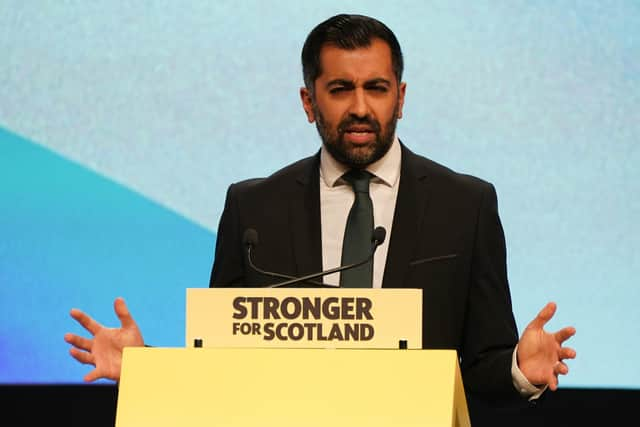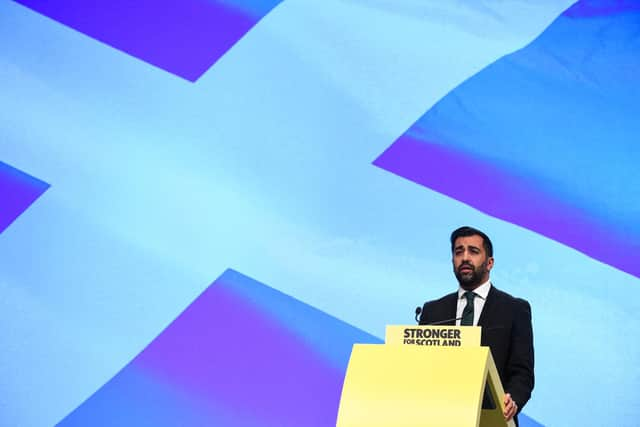Humza Yousaf urged not to U-turn on income tax rises after council tax freeze
Campaigners have urged Humza Yousaf not to ditch his commitment to so-called “progressive taxation” by rejecting proposals to introduce a new income tax band for higher earners.
The Scottish Trades Union Congress (STUC) said there was “no reason why” the First Minister’s indicative support for more redistributive taxation should “dissipate”. The union body’s concerns come after the SNP leader used his conference speech to announce a council tax freeze – a move that has infuriated local authorities.
Advertisement
Hide AdAdvertisement
Hide AdSuch a policy benefits richer households more than poorer, with the tax also “regressive” as it proportionately punishes lower earners harder.


It is understood the Scottish Government is moving away from the possibility of imposing tax hikes on those earning under £50,000 at the next budget, though a final decision is some way away from being made.
The decision to freeze council tax and any future move to increase tax is in the context of the SNP attempting to woo so-called ‘suburban strivers’.
These tend to be young, middle-class earners who have been turned off by the SNP’s tax increases and who are feeling the pinch of the cost-of-living crisis.
No decisions have yet been made on income tax and will only be finalised in advance of the Scottish Budget in December, following forecast work by the Scottish Fiscal Commission.


Despite the freeze on council tax, Mr Yousaf made clear in his speech that he still believes high earners should pay more in tax. He told SNP delegates that “those who earn the most, should pay the most”.
This leaves open the possibility of those at the higher end of the earnings spectrum being taxed more heavily next year to pay for the increased demands on public services. Such an increase could also help bridge the minimum £250 million funding gap caused by the council tax freeze.
One such policy floated by the STUC and tentatively backed by the First Minister during the SNP leadership campaign was a new 44p rate for those earning between £75,000 and £125,140.
Advertisement
Hide AdAdvertisement
Hide AdThe STUC said this could raise as much as £200m, but economists and government insiders put the true figure at well below this.
The Fraser of Allander Institute suggested it could raise £56m, while the Institute for Fiscal Studies estimates it would raise at most £100m and “probably less”.
In September, Mr Yousaf also said he would consider the idea of a potential wealth tax of 1 per cent on wealth, including property, pension wealth and other possessions, above £1m, potentially raising as much as £1.4 billion.
Such a policy is also backed by the Scottish Greens.
The STUC’s general secretary, Roz Foyer, said the council tax freeze was a “concerning move”, would “pile further pressure” on councils and “calls into question” the Government’s commitment to protecting public services.
Ms Foyer said Mr Yousaf’s support for more progressive taxation must not become a further casualty of his leadership.
“We welcomed the First Minister’s pledge to use Scotland’s tax powers to redistribute wealth,” she said. “He had been very vocal, especially during his leadership campaign, about the need for Scotland to progressively tax wealth and was indicatively supportive of STUC tax proposals in raising further public revenue, including introducing a new tax banding for those earning over £75,000.
"We see no reason why that support should dissipate. We now need the First Minister, not to mention all parties who claim to want to rid us of the council tax, to pledge immediate action for its replacement with a genuinely progressive alternative.
"In the STUC's view, this means a property tax based on and proportionate to up-to-date house values. This is the only way that the system can be made fair.”
Advertisement
Hide AdAdvertisement
Hide AdMr Yousaf met with representatives from the council umbrella organisation Cosla on Thursday following a request for an urgent meeting, with council leaders due to meet on Friday to discuss next steps.
A spokesperson for the First Minister said: “This was a frank and constructive meeting in which COSLA made their views clear.”
A Scottish Government spokesperson said: “The Scottish Government already has the most progressive tax system in the UK. It has helped strengthen our social contract with every citizen in Scotland which goes significantly beyond provision in the rest of the UK – including free prescriptions, free access to higher education and the Scottish Child Payment which has helped lift an estimate 90,000 children in Scotland out of poverty.
“The council tax freeze, which will be fully funded by the Scottish Government, will bring additional financial relief to those households who are struggling in the face of rising prices, with some 2.5 million households expected to benefit.
“Decisions on Scottish income tax rates and bands will be announced as part of the Scottish Budget.”
Comments
Want to join the conversation? Please or to comment on this article.
